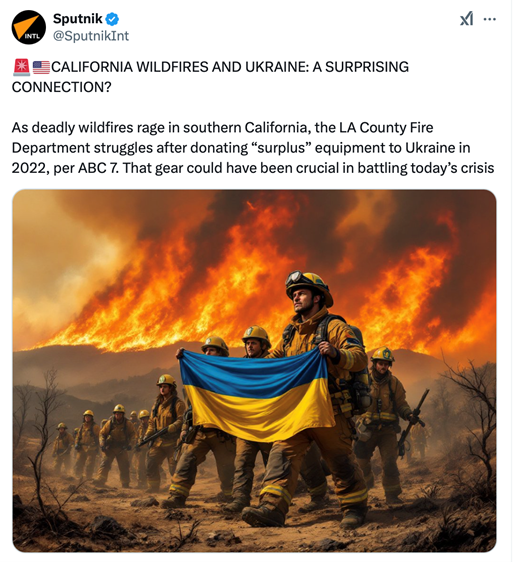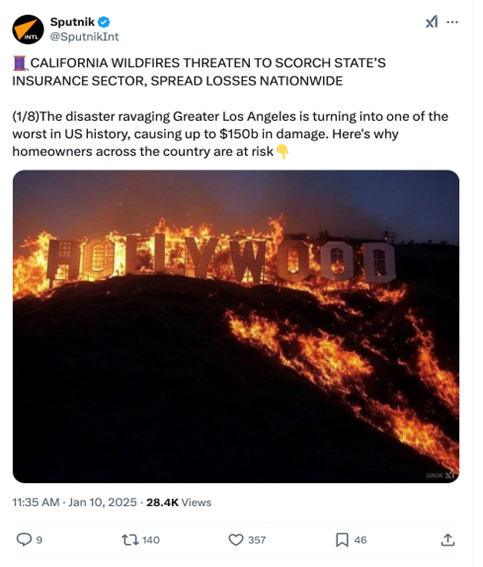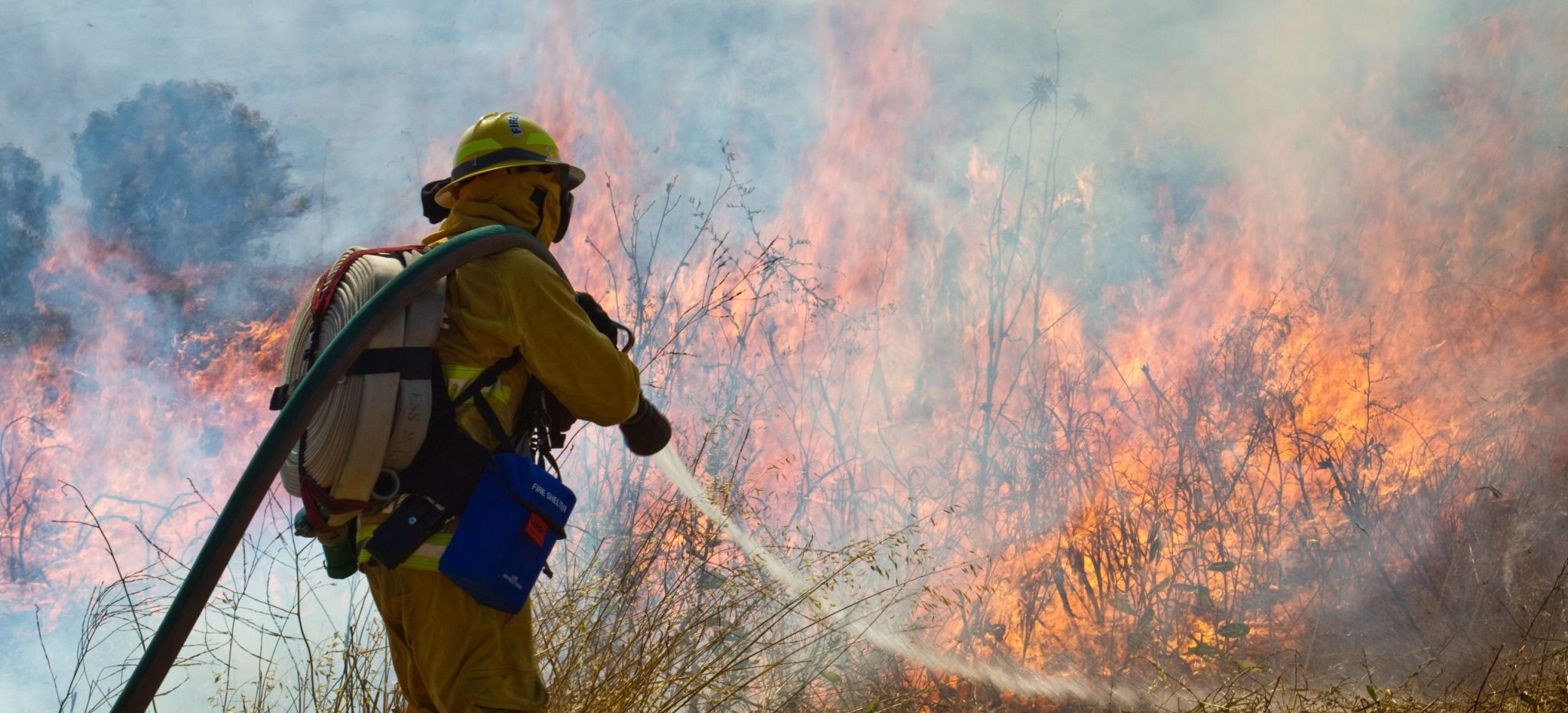Last week, devastating wildfires ignited across Los Angeles County in what is one of the most destructive natural disasters in US history. But as firefighters continue to battle the flames, false and misleading information about the disaster has spread just as quickly on social media. While much of the false information seemingly originated from users in the United States, Russian state-affiliated accounts also leveraged the California wildfires and narratives reverberating among certain segments of the US public to sow division, undermine trust in relief efforts, and reduce public support for Ukraine.
Diverting Resources to Ukraine
Amid the destructive wildfires in Los Angeles, Russian government officials and state-affiliated media have propagated narratives critical of the Biden administration and other Democratic leaders to aggravate political division, particularly on Ukraine, and to denigrate the United States. These narratives often cite the allocation of US resources to Ukraine, arguing that Ukraine’s needs were prioritized over domestic interests. In a press conference on January 14, Russian Foreign Minister Sergey Lavrov claimed the estimated $250 billion worth of damage sustained from the California fires is comparable to the amount Washington “pumped into Ukraine”. Russian-state controlled outlet Sputnik further mocked Biden’s emergency relief payments to victims of the wildfires, claiming that they receive less daily per capita than people in Ukraine and Israel.
Russian state-controlled media outlets further honed in on reports that the Los Angeles Fire Department (LAFD) donated surplus equipment to Ukraine in 2022 to suggest that those donations created a lack of resources to fight fires. Some accounts amplified content that reinforced this narrative, including a misleading video, later debunked by Reuters, that purported to show firefighters resorting to fighting fires with “women’s handbags”. This approach keeps with Russia’s now longstanding strategy to dent US support for Ukraine by playing to pocketbook issues and perceptions that domestic issues have received less attention than foreign ones.

Blaming DEI
Accounts affiliated with Russia echoed narratives prominent among American audiences that claim diversity, equity and inclusion (DEI) initiatives hindered wildfire recovery efforts. Russian state-controlled media outlet RT accused LAFD Chief Kristen Crowly—the first woman and openly gay person to serve in the role—of prioritizing DEI initiatives at the expense of preventing fires. They also falsely claimed that LAFD personnel were cut because the department had “too many white men”. Popular pro-Kremlin TV host Vladimir Solovyov repeated claims that Los Angeles County cut the fire department budget and redirected those funds to DEI initiatives. Sputnik also posted a local news clip of a California resident who claimed that “gay people” were the cause of the fires. Additionally, Russian state media seized on the fires to fuel divides on other partisan policy issues, linking the fires to the “green lobby” and blaming the firefighter shortage on COVID-19 vaccine mandates.
Amplifying AI-Generated Content
In at least one case, Russian state media amplified a misleading image generated by artificial intelligence (AI). On January 10, Sputnik’s English-language X account posted a picture of the iconic Hollywood sign engulfed in flames that was generated by xAI’s image generator, Grok. The image included an AI disclaimer, but it was small and hard to discern. Similar content that purported to show the famous monument on fire reportedly went viral across multiple social media platforms. Many users mistakenly believed it was true.
Sputnik’s post continues a developing trend in Russian state media to use AI-generated content to create sensationalist posts, presumably to drive engagement. Following the aftermath of Hurricanes Helene and Milton last year, RIA Novosti—a prominent news agency that caters to a mostly domestic Russian audience—shared an AI-generated image on their Telegram channel that purported to show a flooded Disney World. Other Russian-language media outlets subsequently spread the image.
Conclusion
Kremlin-affiliated accounts have leveraged the California wildfires to further advance Russia’s geopolitical agenda. In line with the Kremlin’s longstanding propaganda strategy, these accounts exploited narratives that were already present in the US information ecosystem to sow division, undermine trust in relief efforts, and reduce public support for Ukraine. Russia’s messaging on the wildfires further underlines a trend of autocratic states exploiting natural disasters to advance their geopolitical goals. Such efforts further pollute information ecosystems during critical times, fostering confusion and mistrust that can have real-world consequences, including hindering recovery efforts.

The views expressed in GMF publications and commentary are the views of the author alone.





